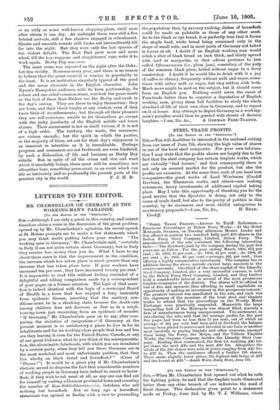MR. CHAMBERLAIN ON GERMANY AS THE WORKING-MAN'S PARADISE.
[To THE Eorros. Or THE "SFEHTATOR."] Sin,—Although I am only a guest in this country, and cannot therefore claim a voice in the discussion of the great problem opened up by Mr. Chamberlain's agitation, his recent speech at St. Helene prompts me to make a few statements which you may think worth putting before your readers. "The working men in Germany," Mr. Chamberlain said, "certainly in Italy (I am not quite certain about Germany), but in Italy they receive less money than you do. What I have to say about these cases is that the improvement in the condition, the increase which has taken place is much greater than any increase that has taken place here. If your workers have increased ten per cent., they have increased twenty per cent." It is impossible to read this without feeling reminded of a delightful and telling comparison made by a correspondent of your paper on a former occasion. The logic of that asser- tion is indeed identical with the logic of a municipal Board of Health in a town that has enjoyed a long immunity from epidemic disease, asserting that the sanitary con- ditions must be in a shocking state, because the death-rate among children does not decrease as fast as in a neigh- bouring town just recovering from an epidemic of measles. "If Germany," Mr. Chamberlain goes on to say, after com- paring the statistics of emigration—" if Germany at the present moment is so satisfactory a place to live in for its inhabitants and for its working-class people that less and less are they leaving it even for the United States, Canada, or any of our great Colonies, what do you think of the misrepresenta- tion, the abominable falsehoods, with which you are inundated by a certain party, when they tell you these Germans are in the most wretched and most unfortunate position, that they live wholly on black bread and horseflesh P" (Cries of "Shame !") It would be a great pity if Mr. Chamberlain's rhetoric served to disguise the fact that considerable numbers of working people in Germany have indeed to resort to horse- flesh, if they wish to eat meat at all, as any one can find out for himself by visiting a German provincial town and counting the number of Ross-Schlilchtereien,—i.e., butchers who sell nothing but horseflesh. Not so long ago a horseflesh restaurant was opened in Berlin, with a view to persuading the population that, by savoury cooking, dishes of horseflesh: could be made as palatable as those of any other meat As to the black or•rye bread, it is perfectly true that it forms the staple food, white bread being consumed only • in the shape of small rolls, and in most parts of Germany not baked in loaves at all. I doubt if an English working man would relish a slice of black bread an inch thick, and thinly spread with lard or margarine, or that odious pretence. to jam called Pflaumenmuss (i.e., plum jam), consisting of the pulp of the common black plum; boiled without Sugar to a tarry consistency. I doubt if he would like to drink with it a jug of coffee or chicory, frequently without milk and sugar, some- times with either milk or sugar, but very seldom with both. Much more might be said on the subject, but it should come from an English pen. Nothing could serve the cause of Free-trade better than to organise a deputation of English working men, giving them full facilities to study the whole standard of life of their own class in Germany, and to report on it at home. Any attempt to depict Germany as a working- man's paradise would then be greeted with shouts of- derisivo laughter.—I am, Sir, &c., A GERMAN FREE-TRADER.






































 Previous page
Previous page